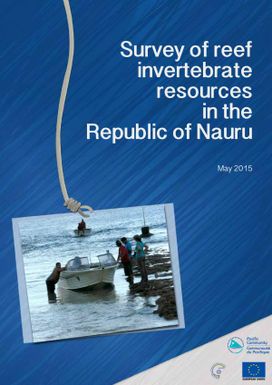Survey of reef invertebrate resources in the Republic of Nauru: May 2015
- Description:
- The people of Nauru are highly dependent on coastal resources for their food security, which has resulted in many invertebrate species being overharvested. Their decline is exacerbated by a lack of regulations to manage and control the impact of fishing. Local residents expressed the need for a status assessment and a request was made to the Pacific Community (SPC) to provide technical assistance. This report presents the findings of the resulting assessment, conducted in the Republic of Nauru in May 2015. The main objective of the work was to assess the population abundance and size structure of several key species, including turban snails (Turbo setosus and T. argyrostomus), belligerent rock shell (Reishia armigera), spiny rock lobster (Panulirus penicillatus) and species of interest to foreign markets, in particular sea cucumbers. Six survey methods were applied to suit the different coastal habitats of Nauru. These were reef benthos transects, reef front timed walks at night, manta tow, reef front timed swims in the daytime, lobster night searches (reef front timed swims at night) and deep-water timed scuba searches. Where possible, information from this assessment was compared with that collected during the PROCFish survey in 2005, to explore changes in resource status over time.
- Display date:
- 2016
- Collections:
- Secretariat of the Pacific Regional Environment Programme (SPREP)
- Publisher:
- Pacific Community (SPC)
- Content partner:
- Secretariat of the Pacific Regional Environment Programme (SPREP)
- Availability:
- Not specified
-
Copyright status: All rights reservedFind out more about what you are able to do with this itemThis item is all rights reserved, with means you'll have to get permission from Secretariat of the Pacific Regional Environment Programme (SPREP) before using it. For more information, please see our use and reuse page.What can I do with this item?Non-infringing useNZ copyright law does not prevent every use of a copyright work, and this item may be hosted by an international institute or organisation. You should consider what you can and cannot do with a copyright work.No sharingYou may not copy and/or share this item with others without further permission. This includes posting it on your blog, using it in a presentation, or any other public use.No modifyingYou are not allowed to adapt or remix this item into any other works.No commercial useYou may not use this item commercially.
Related items
Welcome and warm Pasifik greetings
The information on this site has been gathered from our content partners.
The names, terms, and labels that we present on the site may contain images or voices of deceased persons and may also reflect the bias, norms, and perspective of the period of time in which they were created. We accept that these may not be appropriate today.
If you have any concerns or questions about an item, please contact us.
